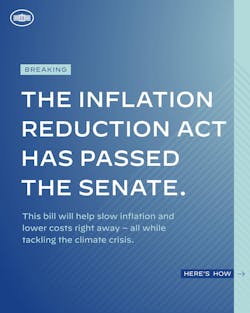Senate Passes Climate Change, Health Bill with EV, Solar Panel Credits
After 18 months of arduous negotiations and a marathon night of debate, the U.S. Senate on Sunday passed President Joe Biden's ambitious climate, tax and health care plan—legislation that could have significant impacts on manufacturing, especially in the automotive space.
Voting as a unified bloc and with the tie-breaking vote cast by Vice President Kamala Harris, Democrats approved the $430-billion spending plan, which will go to the House of Representatives next week, where it is expected to pass before being signed into law by Biden.
The plan, crafted in sensitive talks with members on the right wing of his Democratic Party, would include the biggest US investment ever on climate—$370 billion aimed at effecting a 40% drop in greenhouse gas emissions by 2030.
Biden hailed the passage of the bill, highlighting the work that went into it—and acknowledging that not everyone is happy with the final result.
“It required many compromises. Doing important things almost always does. The House should pass this as soon as possible and I look forward to signing it into law,” the president said.
The bill—officially known as the “Inflation Reduction Act”—passed the Senate with no Republicans voting in favor.
Conservative lawmakers have criticized the bill as wasteful spending, with top Republican Sen. Mitch McConnell (R-Kentucky) accusing Democrats of voting to “double down on their economic disaster.”
Change America for Decades
The bill would provide Americans with a tax credit of up to $7,500 when purchasing an electric car, plus a 30% discount when they install solar panels on their roofs.
But the Alliance for Automotive Innovation, a group representing major automakers, on Sunday said that most cars would not meet the bill's electric vehicle tax credit requirements, calling it a “missed opportunity.”
The legislation would also provide millions to help protect and conserve forests—which have been increasingly ravaged in recent years by wildfires during record heat waves that scientists say are linked to global warming.
Billions of dollars in tax credits would also go to some of the country's worst-polluting industries to help their transition to greener methods—a measure bitterly opposed by some liberal Democrats who have, however, accepted this as a least-bad alternative after months of frustration.
Biden, who came to office with promises of sweeping reforms, has seen his hopes dashed, then revived, then dashed again.
Democrats’ narrow edge in the Senate has given a virtual veto to moderates such as Joe Manchin of West Virginia, who earlier had used that power to block Biden's much more expansive Build Back Better plan.
But in late July, Senate Democratic leader Chuck Schumer (D-New York) managed to engineer a compromise with the West Virginian, whose state's economy depends heavily on coal mining.
“This bill is going to change America for decades,” Schumer said after its passage, while Manchin tweeted that it “will lower the inflation taxes that have been so hurtful for West Virginian and American families.”
The bill would provide $64 billion for health care initiatives and ensure a lowering of some drug costs—which can be 10 times more expensive in the United States than in some other rich countries.
But progressive Democrats long ago had to give up their ambitions for free preschool and community colleges and expanded health care for the elderly.
“Millions of seniors will continue to have rotten teeth and lack the dentures, hearing aids or eyeglasses that they deserve,” Sen. Bernie Sanders (I-Vermont) said from the Senate floor. “This bill, as currently written, does nothing to address it.”
But fellow Democrats, eager to pass the legislation ahead of November midterms when control of Congress is at stake, have rejected any change in the text.
To help offset the plan’s massive spending, it would reduce the U.S. deficit through a new 15% minimum tax on companies with profits of $1 billion or more—a move targeting some that now pay far less.
A report from the Congressional Joint Committee on Taxation found that about half of the revenue raised from that minimum tax would come from manufacturers.
That measure could generate more than $258 billion in tax receipts for the government over the next 10 years, by some estimates.
Copyright 2022, Agence France-Presse (IndustryWeek staff members contributed to this report)
About the Author
Agence France-Presse
Copyright Agence France-Presse, 2002-2025. AFP text, photos, graphics and logos shall not be reproduced, published, broadcast, rewritten for broadcast or publication or redistributed directly or indirectly in any medium. AFP shall not be held liable for any delays, inaccuracies, errors or omissions in any AFP content, or for any actions taken in consequence.
